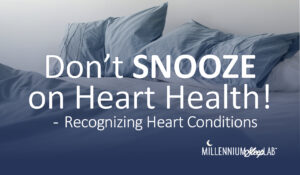Millions of Americans experience a heart condition, and approximately 700,000 deaths each year in the US are related to heart disease. Do you know the signs of a heart attack? Do you know the less recognizable signs of other heart conditions like Atrial Fibrillation and High Blood Pressure?

Atrial Fibrillation, often called A-fib, is a common condition see by cardiologists. This is when the signal in the upper chambers of the heart first too rapidly or irregularly and get out of sync with the lower chambers. Unfortunately, it significantly increases the chance of stroke and can lead to heart failure.
While Atrial Fibrillation is often unnoticeable, there are some commonly reported symptoms:
- Sensations of a fast, fluttering or pounding heartbeat (palpitations)
- Chest tightness or throbbing
- Dizziness or Lightheadedness
- Fatigue
- Weakness
- Obstructive Sleep Apnea
- Central Sleep Apnea
Patients often report because so tired they couldn’t get out of bed for a couple days before seeing a medical professional. The occurrence of atrial fibrillation can happen for short periods (called paroxysmal), or A-fib can persistent for days of even months. Cardiologists are often able to treat or control this condition a with medication, although if it persists, they may recommend a cardiac ablation procedure to physically block the overactive signals. Treating sleep apnea may also be part of the treatment plan.
High Blood Pressure is the most common heart condition, and recent reports show that half of American adults have at least mild hypertension, or high blood pressure. Unfortunately, it is called the “silent killer” because there are usually no symptoms, but it is a precursor to more serious heart conditions and heart disease.
The risk of high blood pressure is strongly tied to:
- Obesity
- Obstructive Sleep Apnea
If your Body Mass Index (BMI) is elevated or you have symptoms of sleep apnea (snoring, gasping, witnessed cessation of breathing, or morning headaches), it is recommended to monitor blood pressure and address the sleep apnea. Learn more on blood pressure and sleep apnea.
With Severe high blood pressure, some patients report:
- Facial flushing
- Blood spots in the eyes
- Nose bleeds
- Headaches
- Vision problems
- Pounding in the chest, neck, or ears
Identifying high blood pressure and treating with lifestyle changes or medication are essential to reducing risk of heart disease, heart attack, and stroke. Treating sleep apnea can also help reduce blood pressure.
Heart Attack is the most important heart condition to recognize, of course. Seeking immediate medical attention for any of these symptoms can mean life or death.
- Chest pain or discomfort. Most heart attacks involve discomfort in the center or left side of the chest that lasts for more than a few minutes or that goes away and comes back. The discomfort can feel like uncomfortable pressure, squeezing, fullness, or pain.
- Feeling weak, light-headed, or faint. You may also break out into a cold sweat.
- Pain or discomfort in the jaw, neck, or back.
- Pain or discomfort in one or both arms or shoulders.
- Shortness of breath.
It is important to remember that these symptoms may be mild but the consequences severe. Over Learn more about your risk, the event, and the recovery.
Recognizing these signs and symptoms is the first step to identifying and managing heart disease.
Sources:
https://www.mayoclinic.org/diseases-conditions/atrial-fibrillation/symptoms-causes/syc-20350624
https://www.heart.org/en/health-topics/high-blood-pressure/the-facts-about-high-blood-pressure
https://www.mayoclinic.org/diseases-conditions/high-blood-pressure/diagnosis-treatment/drc-20373417
